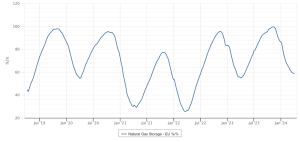Britain Seeks Views On 2027 Carbon Border Tax
March 26, 2024P432: What is it?
April 9, 2024Europe has ended the winter season with record levels of natural gas in storage, putting the region in a much better position to move on from the energy crisis that has overshadowed it for more than two years. Gas storage for the EU at the end of March, considered the end of the winter season by the industry, stood at just under 60% full. This is about 3 percentage points higher than the previous high, set last year.
The plentiful levels put the EU in a comfortable starting spot as it refills its storages over the summer and analysts warn that the bloc may need to scale back imports of liquefied natural gas in the coming months to avoid capacity filling too early.
The generally mild winter across Europe, strong imports of LNG, lacklustre economic activity and the EU’s demand reduction targets helped keep gas usage muted. Demand was approximately 20% lower in February 2024 than 2019-2021 averages. Below summarise how European Gas storage levels have evolved over the last five years.
Five-Year European Gas Storage Levels

Europe’s energy crisis began in 2021 as the region exited a prolonged cold winter with low natural gas storage levels. Concerns over tight supplies accelerated as Russia started to send less gas to Europe, in what was perceived by some as a tactic to pressure Germany and Brussels to approve the start-up of the controversial Nord Stream 2 gas pipeline.
Europe has now gone through consecutive winters without significant disruptions to its energy system, something few believed possible at the start of the crisis, when blackouts were talked of as a real possibility. The EU could achieve its target to reach 90 per cent capacity by the start of November in early August if the injection pace is similar to last year.
Despite the record volumes of gas in storages for this time of year, the price of TTF, Europe’s natural gas price benchmark, has risen around 20 per cent compared with a month ago when prices dropped to pre-energy crisis levels, as supplies tightened owing to maintenance at a major US export facility.
For a more detailed discussion on how your business can control and minimise future UK and European energy spend please contact hello@gleg.co.uk.
